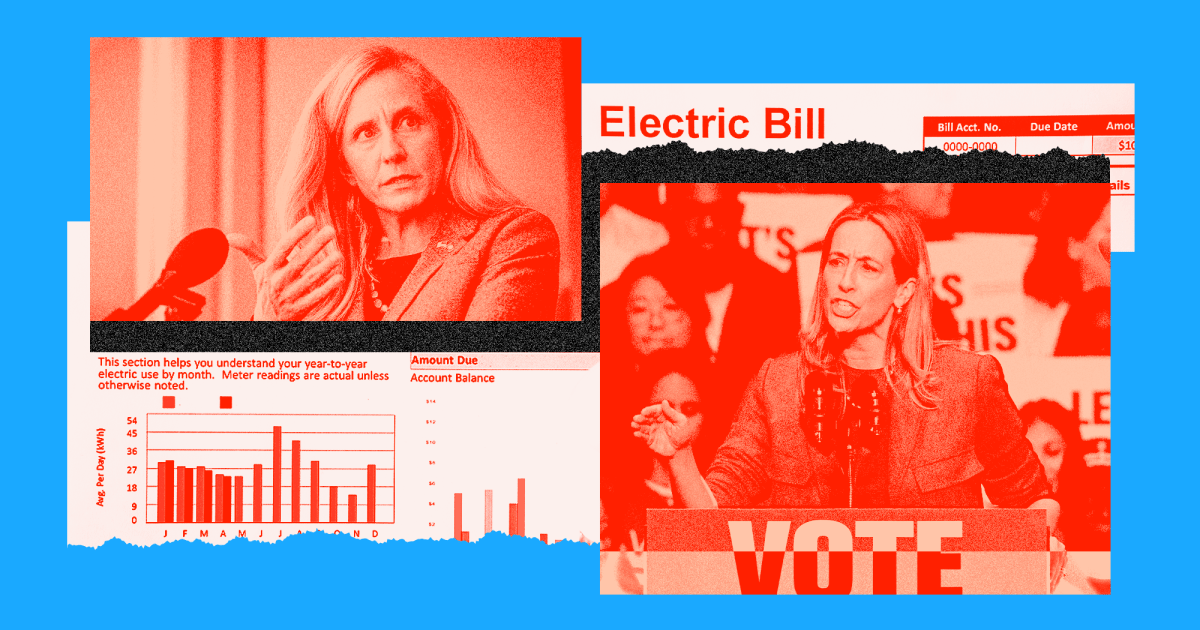On the campaign trail in 2024, President Donald Trump promised to halve Americans’ energy bills by January 2026.
After his win, his administration pushed policies that undoubtedly contributed to their rise. They tried to squash cheap, local energy from renewable sources while bankrolling the dying coal industry. They put tariffs on materials needed to keep the grid running smoothly. And they gutted regulations to help the AI industry build more and more energy-gobbling data centers—all while trying to power them with fossil fuels.
With less than two months to Trump’s self-imposed deadline, household electricity bills are up 11 percent on average since his inauguration. Gas bills have spiked even higher. More than 70 percent of Americans—regardless of party—say they’re concerned about rising utility payments. Trump, undeterred by reality, is claiming that “our energy prices are down.”
Voters have taken notice. In last Tuesday’s elections, Democrats notched major wins, including in conservative areas, at least in part because energy was on the ballot.
Democrats beat GOP incumbents on Georgia’s utility commission by 20 points—the party’s first statewide win in nearly two decades.
In New Jersey, where electricity bills have risen up to 20 percent since June, Democratic Governor-elect Mikie Sherrill ran on electricity prices, promising to freeze utility rates on day one in office.
In Virginia, data center Ground Zero, Democratic Governor-elect Abigail Spanberger promised to make the power-intensive centers pay for the grid updates needed to keep them running, alongside investing in green energy to meet the growing electricity demand.
Democratic and Republican positions on energy policy have been night and day, explains Daniel Jasper, a senior policy advisor with the climate nonprofit Project Drawdown.
“Republican messaging has been very incoherent on this issue,” says Jasper, adding that “much of [it] has been predicated on outright lies.” In addition to failing to articulate concrete policy plans for reducing costs, Jasper says, Republican platforms frame renewable energy and fossil fuels as two sides of a culture war.
Democrats, on the other hand, have a clear message, he says: “Renewable energy will be one big part of the solution for rising costs.” More than that, they are able to emphasize that the cheap, local energy “increases energy security and reduces our reliance on things like foreign oil,” he adds.
“Democrats want to bring cheaper energy online faster to drive down costs,” Lori Lodes, the executive director of Climate Power, wrote in an election-night memo, “while Republicans are taking energy options offline to benefit their billionaire donors and spike costs for everyone else.”
What really demonstrated that energy was on the ballot was the unexpected visibility of the Georgia Public Service Commission race. The commission is an obscure, often-ignored state office that regulates electricity prices. Residential customers of the state’s largest utility provider, Georgia Power, have faced year-over-year price hikes of $518, on average, according to the Atlanta Journal-Constitution. Renewable energy and affordability–focused Democrats Peter Hubbard and Alicia Johnson ousted incumbent Republican board members by a margin of 20 points, the first time in nearly 20 years that the Democratic Party has won a statewide office in Georgia.
“Incumbent public service commissioners very rarely lose reelection,” Caroline Spears, head of Climate Cabinet, remarked on the podcast Volts. “To come out of Tuesday with a 60-40 is pretty unprecedented.”
“I don’t remember the last time there was such national attention on such a very specific election,” Jasper, of Project Drawdown, noted. The focus on the Georgia race, he says, signals “an important bellwether for the fact that energy is going to be a very prominent issue going forward.”














